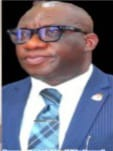Procurement scandal Exposes ‘Aki and Paw Paw’ at Free Education Program
Ambrose Sesay Sacked, Next to go is Kallon…
The recent dismissal of Ambrose Sesay, the former Project Coordinator of the Free Education Project Secretariat (FEPS), marks a significant turning point for Sierra Leone’s flagship initiative under President Bio’s administration. This reform is expected to usher in much-needed change and renewed focus on the core objectives of the program providing quality, accessible free education to all Sierra Leonean children.

Despite the initial skepticism surrounding Ambrose Sesay’s competency for the role, and even accusations of being installed by familiar influence specifically, his brother-in-law it is evident that circumstances have come to a point where the outcomes have spoken for themselves. The harvest, as they say, has ripened and fallen, revealing the fruits of mismanagement, disrespect for authority, and a culture of manipulation that hindered the program’s progress.
What was once a noble cause has been overshadowed by questionable practices such as the manipulation of contracts and the suppression of qualified Sierra Leoneans with genuine expertise. Such acts not only undermine trust in the initiative but also stall the development and progress Sierra Leone desperately needs in its education sector.

It is important for the World Bank and other international partners to recognize that this challenge is not isolated. For instance, the controversy surrounding Mohamed Kallon, the procurement specialist acclaimed for allegedly rigging bids known locally as the Aki and Pawpaw scandals raises concerns about the integrity of the procurement processes.
As we await the next steps, the question remains: what will be the future of FEPS under new leadership? Will there be a thorough overhaul of the management and procurement processes? Or will the same old patterns persist under different leadership? The Sierra Leonean people deserve transparency, accountability, and integrity to ensure that the flagship project truly benefits the intended beneficiaries our children and communities.
In closing, the downfall of Ambrose Sesay may serve as a wake-up call for all stakeholders involved. It is an opportunity to reassess and rebuild a system rooted in fairness, competency, and respect for authority values that are essential for the progress of Sierra Leone’s education and development landscape.